
Have you heard the news?
Artificial Intelligence is revolutionizing eCommerce!
This technology has many exciting facets to explore, from natural language processing to generative AI, ChatGPT, data mining, and deep learning. Social media is buzzing about the benefits these emerging technologies can bring to your eCommerce business. Are you ready to take advantage of this incredible opportunity? Or should you wait for more research before taking your step?
If you are hesitant to adopt AI, these must be your common questions:
How good is generative AI for creating eCommerce content?
How risk-free is predictive AI for market research and insights?
Is deep learning really reliable for creating accurate audience personas?
We understand your concerns, but should you doubt AI in e-commerce when it can boost profitability by 59% by 2035? Don’t worry; our comprehensive blog on artificial intelligence in e-commerce and whether it will be a good fit for your business will remove all your doubts and fears.
The short answer? Yes.
If you don’t incorporate AI into your business processes soon enough, your competitors might get ahead of you. This is because the AI-enabled eCommerce market is projected to reach $16.8 billion by 2030, growing at a rate of 15.7% CAGR in the next 8 years, and 51% of businesses have already adopted it.
One of the most potent AI use cases in e-commerce is customer service analytics, which 57% of early respondents in emerging economies favor (McKinsey 2021 report). Look at the infographic to see how AI is rapidly transforming e-commerce.
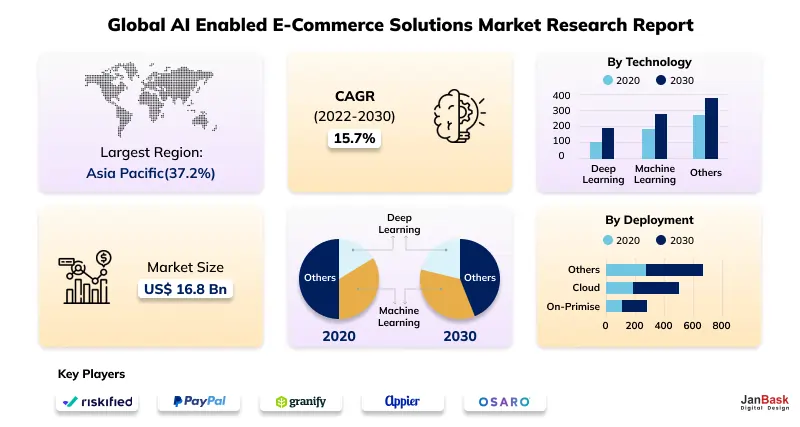
So you see, gone are the days when your business could have considered AI integration as another “nice-to-have” feature that could make you look cool and tech-savvy. If you don’t amp up your AI game soon, you risk losing a major slice of the revenue pie that others might happily hog down.
Interested? Let’s get going about how you can get started!
Unlock the Future of E-commerce with AI: Explore Now!

AI has several real-world applications, but only specific AI use cases in eCommerce can serve your business. The benefits of AI in eCommerce are plenty, as long as you’re aware of how to leverage them in the most appropriate proportions.
Chatbots can personalize the customer experience for your brand, thereby retaining brand loyalty. What’s more? Chatbots are the lead-pumping machine that you have always wanted! They keep your customers engaged in meaningful conversation, dispensing valuable information without getting tired, confused, or frustrated. And what can any customer love more than getting the right answer to their question within seconds?
Sure, chatbots can improve your website’s shopping experience by interacting with visitors in real-time, but did you know large language models (LLMs) can be an absolute game changer for your UX? How? Well, let us help you know.
If someone searches “Show me red shoes with bow and wide mouth for my birthday party,” an LLM integration would better handle the query. No other technological facet can fully comprehend user intent to return with an accurate result as soon as an LLM.

Enhance your customers’ needs by equipping them with reliable product data, especially since 60% of shoppers seek a better online shopping experience. With AI’s ability to help customers immediately find what they are looking for, with additional suggestions from a broader range of similar products, it cannot be overlooked. AI-powered with behavioral data to update user attributes and categories in real-time by leveraging text and images. Peek at the infographic below to know how it works:
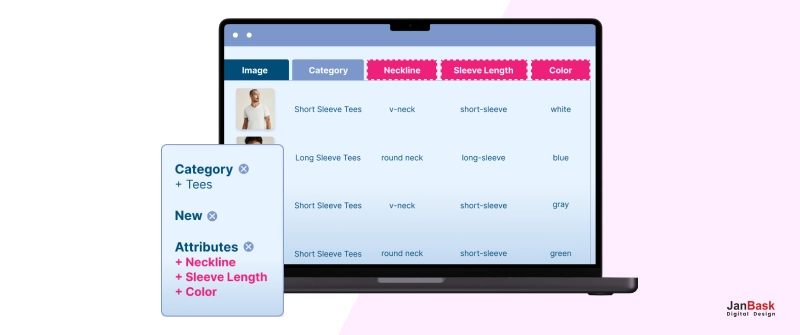

Have you seen those “You May Be Interested In…” or “You May Also Like…” recommendations pop-up or slide-in while browsing a commercial website? Well, that’s AI performing its uncanny magic yet again!

You can also leverage real-time human interactions to make precise product recommendations to your online shoppers to serve your business objectives. Thus, considering your revenue per visitor (RPV), profit margin, or abandoned cart rate, you can plug in your recommendations where visitors will likely see and interact with them, such as your home page, product page, pop-ups, landing pages, or others.
How about guessing right what your customers want from your website before they can? Sounds like some crystal ball gazing magic, doesn’t it? Well, the name of the magic trick is predictive text. This is an improved version of product search, which, when paired with a more robust autocomplete functionality, can help you become profitable beyond your dreams! Nearly 50% of online shoppers would like the predictive text feature on a retailer’s website, but only 19% have it.
Imagine how much your website visitor retention would skyrocket with a predictive search feature or how many potential customers you may lose by not including it. With a 16.5% increase in average order value and a 13% conversion rate, you cannot choose to ignore it.

Don’t lag when markets turn their tides! Stay ahead by getting intelligent insights from your AI engines to price your products accordingly! The name of the game is dynamic pricing, and you can get a fair idea of how it works by checking out the infographic below:
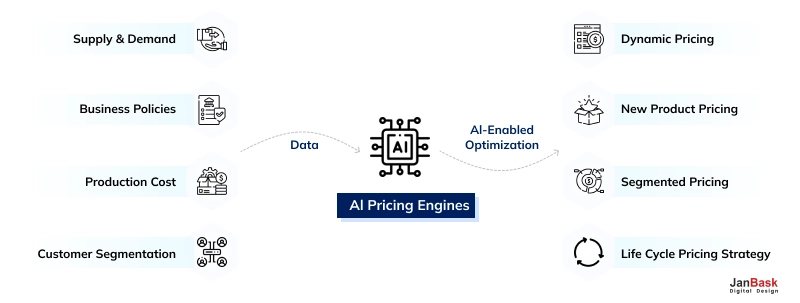
Dynamic pricing works by factoring demand and supply, product competition, and general customer behavior. For instance, as AI native platforms determine product rankings, they can control prices based on a product's online interactions. So, considering the total of a product’s macro interactions, including clicks, purchases, and add-to-cart operations over some time, AI can alter a product’s pricing. Alternatively, AI can take a different approach to maximize conversions from a buyer, such as presenting first-time buyers with reduced prices.
However, if you are a B2B eCommerce outlet, AI lets you control prices visible across different accounts so that you can regulate pricing, restrictions,
As for a real-life example of a company using dynamic pricing strategies, Amazon prices its products up or down based on shifts in its criteria.

Traditional customer segmentation tactics used broad strokes to group people into a demographic, making simplistic and erroneous assumptions about an ideal target customer. However, technology has evolved with the markets, so your eCommerce venture can get precise, targeted, real-time customer segment insights that you can leverage. See the screenshot from Campaign Monitor that predicted a 760% increase in revenue from AI-segmented campaigns.

Additionally, you can leverage voluntarily shared data from your customers across diverse platforms such as social media, email, SMS, and others. So, you can harness onsite and off-site customer interactions for truly holistic customer information that AI can further parse for more precise insights. Currently, AI is poised to grow further in the social media space, evidenced by the following infographic:
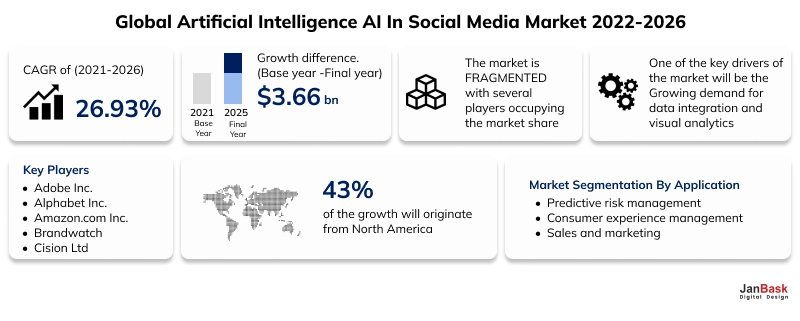

You wouldn’t want to risk losing your online reputation to fraudsters out to make a quick buck while you work hard to provide a comfortable online shopping experience. Of course, you may have basic cybersecurity checks to prevent online fraud, but are you aware of the malicious attacks that have evolved and exist today? If not, we suggest you take a peek at the table below to get an idea:
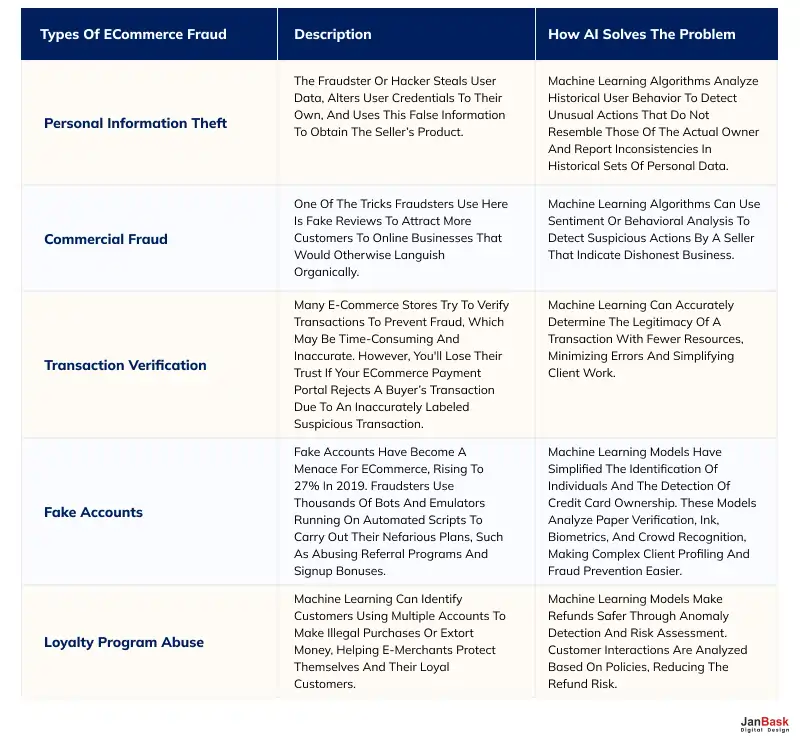
You can look at the following infographic to see how AI can protect your eCommerce venture.
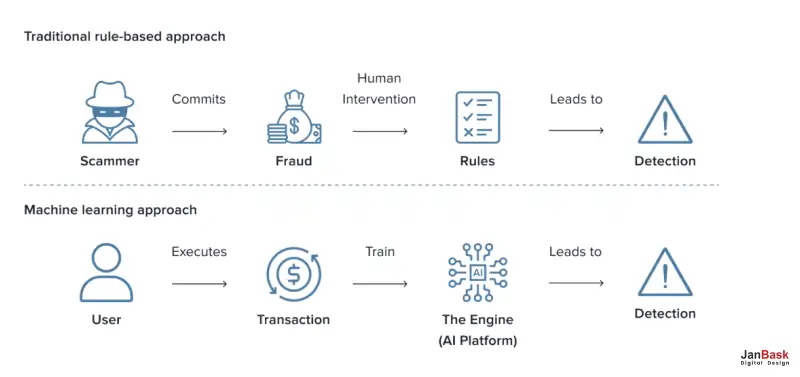
This machine-learning model works with a specific cut-off date spanning one, two, or three months, depending on your business objectives. Then, every month, your active customers’ database will be passed through the predictive model to return the churn probability for every customer. The generated list is sorted from high to low probability, where specific customer retention actions, such as gift cards or discounts, can be taken for demonstrably high churn customers. Similarly, those with low churn probabilities require no action.
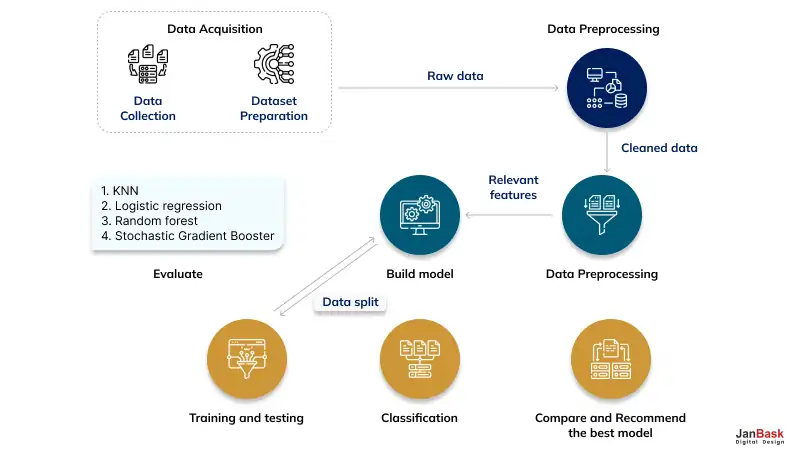
Several tools allow you to sense customer demand for your products before a specific timeframe. Thus, you can stock and restock your inventory in accordance with accurate market and supply chain reality. Furthermore, you can streamline your replenishment parameters through machine learning.
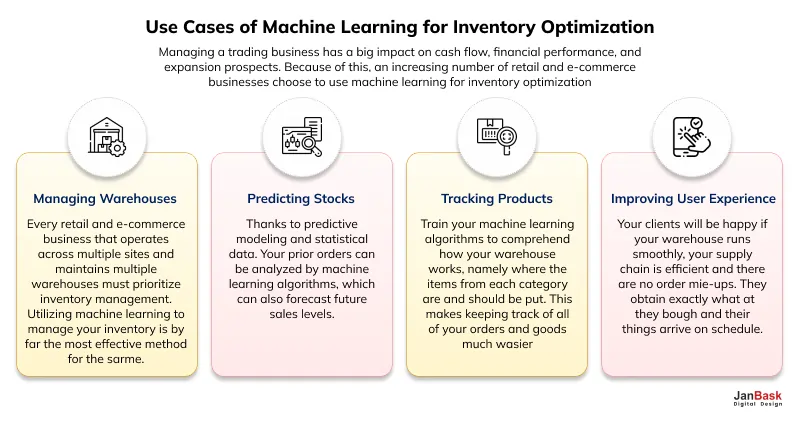
We know AI and all its exciting buzz might seem too daunting to implement for your eCommerce venture right now, but there’s no need to panic! Here, you can find answers to some of your common concerns, which other eCommerce ventures also share.
We hear you if you are one of the 70% of commerce leaders who find inadequate data challenging in implementing AI. To maximize the business benefits of using artificial intelligence/deep learning in e-commerce, ensure that your company’s legacy and ongoing data is in a consistent format. To comply with data privacy regulations while sorting and cleaning your data, use “data harmonization,” which can further fine-tune a pre-existing Large Language Model (LLM). These LLM models run on deep-learning techniques to understand, generate, and predict new content. The best models will help you leverage your business’ transactional, product, order, fulfilment, and other commercial data integrated with your CRM and any third-party data while maintaining strict data security according to GDPR, CCPA, and HIPAA laws.
This is another challenge because 69% of customers are open to exploring AI in eCommerce, whereas 17% don’t trust eCommerce companies to responsibly manage their data and 13% doubt companies’ ethicality with their data. So what should you do? You must be transparent about your data collection and privacy measures. Moreover, you must lay out clear guidelines for your business usage around AI. This means you must provide crystal-clear answers to questions like:
Another hurdle that companies face is the lack of a cohesive data strategy across departments within the team. Therefore, everyone at your company must know your common AI goals while benefitting from a dedicated task force, management sponsorship, and adequate resource allocation. Next, your employees must be trained for activities within your business that can generate value so AI can be deployed for data acquisition, engineering, and compliance in that direction.
As an eCommerce leader, you must be vigilant about cases of bias and harmful discrimination displayed by your company’s algorithm. Train and sensitize your team about bias accidentally fed or produced by your company’s LLM model, wherein specific segments of your customers and products may be harmed. For instance, Amazon’s secret algorithm was reportedly biased against women. Brace your company for these potential legal hassles:
Let us explore how big brands have successfully implemented and upscaled AI systems into their processes to generate higher returns. To begin, here’s how renowned streaming platforms have leveraged AI into their systems:
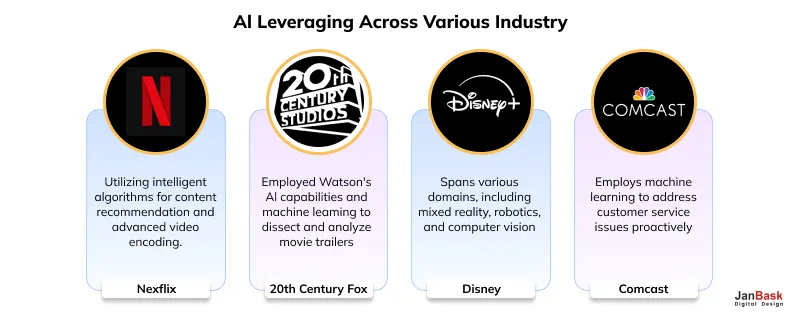
Here’s another interesting scenario! Fake customer reviews have wreaked havoc on the online reputation of several businesses. The problem has become such that customers don’t even trust genuine reviews upon viewing them! Thankfully, AI systems can parse through heavy volumes of user generated content, especially that already available on the web. For instance, Aspectiva gathered all positive reviews for the Las Vegas hotel posted online to weed out possibly fake reviews submitted to their platform. Check out the screenshot below:

Remember we discussed chatbots being a boon to eCommerce businesses earlier in this blog? Well, here’s an advanced version of those chatbots. Presenting Shopbot- a chatbot that can find the best product within your budget, locate a product online through merely a smartphone snapshot, provide suggestions, and even create virtual trial rooms! See what we mean through Mode.ai’s screenshot below:

Are you excited to implement AI functionalities into your business but are overwhelmed by the seemingly limitless options of AI tools present today? Don’t worry; we’ve assembled a ready reckoner of intelligent tools for all your requirements in one place. Have a look:
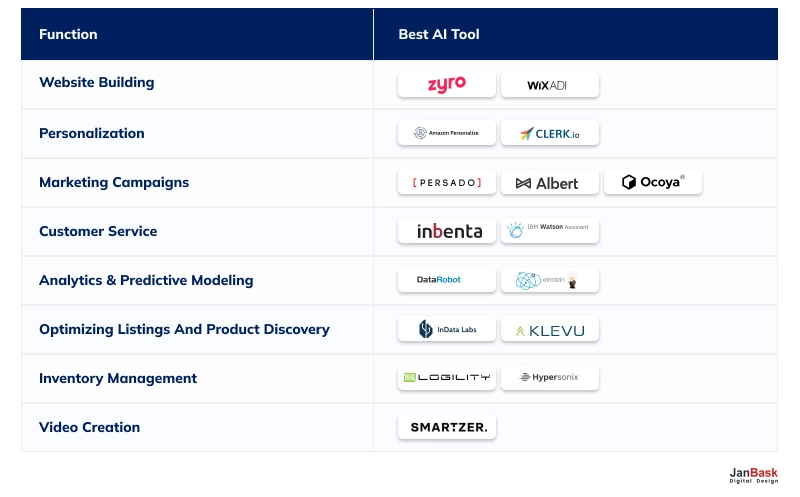
The application of generative AI in e-commerce has revolutionized how businesses interact with their customers. By utilizing generative AI, businesses can now automate various tasks such as generating product descriptions, creating personalized recommendations, and designing customized products that cater to each customer's unique preferences. This has significantly improved customer experience and engagement, resulting in higher levels of customer satisfaction and brand loyalty.
Amazon has successfully integrated artificial intelligence (AI) into numerous aspects of its platform. From making product recommendations to managing inventory and optimizing logistics, AI has become an indispensable tool for Amazon. AI is also used to detect fraudulent activities and automate customer service tasks. Overall, Amazon's use of AI has significantly improved its operational efficiency, enhanced customer experience, and allowed it to stay ahead of the competition.
Artificial intelligence (AI) has the power to revolutionize the way Amazon sellers operate their businesses. By leveraging AI-powered tools, sellers can gain valuable insights into market trends, enabling them to make informed decisions about the products they sell and the prices they charge. AI can also help sellers automate their inventory management processes, reducing the risk of stockouts and overstocking. In addition, AI can enhance product visibility through targeted advertising, increasing the chances of product discovery by potential buyers. With the help of AI-powered chatbots and automated responses, sellers can improve their customer support services, providing customers with timely and accurate information whenever they need it.
Google provides a range of Artificial Intelligence (AI) services via its Google Cloud Platform (GCP), which includes several services that can be accessed for free within specific usage limits. Some of the most popular AI services offered by Google Cloud Platform are Google Cloud AI Platform, AutoML, and TensorFlow. These services enable users to build, train, and deploy machine learning models, as well as create custom models using pre-built models without requiring a deep understanding of complex AI algorithms.
For over two decades, Amazon has been at the forefront of leveraging artificial intelligence (AI) technologies to enhance its operations. The e-commerce giant has gradually integrated AI into various aspects of its business, starting as early as the 2000s. With significant developments such as the introduction of recommendation systems and fulfillment center automation, Amazon has been able to streamline its processes, improve customer experience, and stay ahead of the competition.
Artificial intelligence is here to stay, transforming the eCommerce industry faster than you can consider adopting it for your business. That’s why you must take our advice and be proactive enough to incorporate it ASAP! But before that, you must tighten the screws of your eCommerce venture with leakproof technical assistance–which can only be found in one place!
Enter JanBask Digital Design, the ultimate name in eCommerce web design, website development, SEO, and digital marketing. With our years of experience and expertise, you can take on any technological evolution head-on! Contact us today to experience the difference!
Interested in our Ecommerce Web Design and Web Development Services

Leave a Reply